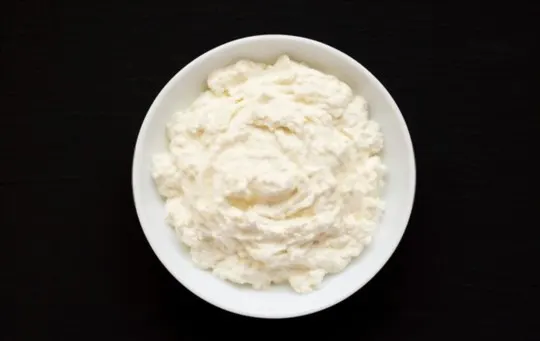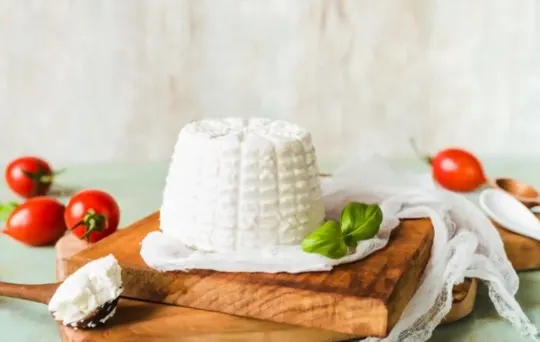Do you want to take your recipes from good to exceptional?
Or maybe you’re looking for the perfect substitute in a pinch?
If so, it’s worth taking a look at mascarpone and ricotta cheese.
These two types of cheese provide distinct textures, but they can look surprisingly similar when put side-by-side.
Knowing how these cheeses differ will give chefs of all skill levels an extra layer of precision over their cooking abilities—especially because one could be a better choice than the other depending on what you’re baking or preparing!
In today’s post, we’ll compare mascarpone vs ricotta cheese and identify their strengths and weaknesses for different culinary pursuits. Let’s dive in!
When to Substitute

Ricotta and mascarpone are two popular Italian cheeses that are often used in recipes for lasagna, tiramisu, and cannoli.
Though they are both white, creamy cheeses, there are some key differences between the two.
Ricotta is made from whey, the liquid left over from making other kinds of cheese.
It has a light, fluffy texture and a mildly sweet flavor.
Mascarpone, on the other hand, is made from cream that has been thickened with rennet.
It is richer and more flavorful than ricotta, with a smooth, velvety texture.
So, what’s the best substitute for ricotta in a recipe? If you’re looking for something with a similar texture, cottage cheese is a good option.
For a closer match in terms of flavor, try using cream cheese or goat cheese.
And if you want to really impress your guests, use fresh mozzarella.
Can I Use Mascarpone Instead Of Ricotta?

Mascarpone and ricotta are two popular Italian cheese varieties with a few key differences.
For one, mascarpone is made from cream, while ricotta is made from whey, the watery part of milk that’s left over after the cream has been removed.
This gives mascarpone a higher fat content than ricotta, which makes it richer and more decadent.
When it comes to taste, mascarpone is sweet and slightly tangy, while ricotta is milder with a slightly grainy texture.
As for uses, mascarpone is often used in desserts like tiramisu or as a decadent addition to savory dishes.
Ricotta, on the other hand, is typically used in savory dishes like lasagna or stuffed shells.
So, can you use mascarpone instead of ricotta? The answer is yes, but it really depends on what you’re making.
If you’re looking for a richer flavor and texture, then mascarpone is a good choice.
But if you want a milder flavor and a lighter dish, then ricotta is probably your best bet.
Can I Substitute Ricotta For Mascarpone?

Ricotta and mascarpone are two types of Italian cheese that are often used in cooking.
They have a lot in common, but there are also some key differences that you should be aware of before making a substitution.
Ricotta is made from whey, the liquid left over from making other types of cheese.
Mascarpone, on the other hand, is made from cream that has been thickened with an acid like lemon juice or vinegar.
Ricotta is lighter and fluffier than mascarpone, and it has a milder flavor.
Mascarpone is richer and creamier, with a slightly sweet taste.
So, can you substitute ricotta for mascarpone? The answer is yes, but the dish will not be quite the same.
Ricotta will not give the same creamy texture or rich flavor as mascarpone.
If you’re looking for a close approximation, you could mix ricotta with a little bit of heavy cream to make it more like mascarpone.
Otherwise, it’s best to use the cheese that your recipe calls for.
Ricotta Vs. Mascarpone: Differences And Similarities
Though ricotta and mascarpone are both Italian cheeses, they have some key differences.
Ricotta is made from whey, the liquid left over from making other cheeses.
Mascarpone, on the other hand, is made from cream.
This gives ricotta a light, airy texture, while mascarpone is rich and creamy.
Ricotta also has a milder flavor than mascarpone.
This makes it a good choice for dishes where you don’t want the cheese to overpower the other flavors.
Mascarpone, on the other hand, is perfect for desserts or as a spread on toast or crackers.
So, when should you use ricotta and when should you use mascarpone? If you’re looking for a cheese that will add creaminess without overwhelming other flavors, ricotta is a good choice.
If you want a cheese with a richer flavor and texture, go for mascarpone.
Taste and Texture
Ricotta and mascarpone are two types of cheese that are often used interchangeably.
While they may look similar, they actually have very different taste and textures.
Ricotta is a fresh cheese made from cow’s milk.
It has a mild, slightly sweet flavor with a grainy texture.
Mascarpone, on the other hand, is an Italian cream cheese made from cow’s milk.
It is rich and creamy with a sweet, nutty flavor.
So, what’s the difference? Well, ricotta is made from whey, the liquid left over from making other types of cheese.
Mascarpone is made from cream that has been slowly cooked to thicken it.
This makes mascarpone richer and creamier than ricotta.
So, when should you use each cheese? Ricotta is typically used in savory dishes like lasagna or stuffed shells.
Mascarpone is usually used in desserts like tiramisu or cheesecake.
But really, it all comes down to personal preference.
So go ahead and experiment.
Uses
Ricotta and mascarpone are both types of cheese that can be used in a variety of ways.
Ricotta is a fresh cheese made from cow’s milk, while mascarpone is a richer, creamier cheese made from cream.
Ricotta can be used in savory dishes like lasagna or sweet dishes like cannolis, while mascarpone is often used in desserts like tiramisu or as a filling for cakes and pastries.
Ricotta and mascarpone are similar in some ways and different in others.
Both cheeses are white and have a mildly sweet flavor.
However, ricotta is lower in fat than mascarpone, and it has a lighter, fluffier texture.
Mascarpone, on the other hand, is richer and creamier.
It also has a more pronounced flavor that some people find to be slightly tangy.
So, what’s the difference between ricotta and mascarpone? The main difference is in the way they are made.
Ricotta is made from cow’s milk that has been curdled with an acid, while mascarpone is made from cream that has been thickened with an enzyme called rennet.
This gives mascarpone its characteristic rich flavor and creamy texture.
So, when should you use ricotta and when should you use mascarpone? If you’re looking for a cheese to use in savory dishes, go with ricotta.
It’s lighter and won’t overpower the other flavors in your dish.
If you’re making a dessert or you want something with a richer flavor, go with mascarpone.
Just keep in mind that it’s higher in fat than ricotta, so it’s not the best choice if you’re watching your waistline.
Conclusion
In conclusion, ricotta and mascarpone are two very different types of cheese.
They have different textures, tastes, and uses.
However, they can be used interchangeably in some recipes.
When substituting ricotta for mascarpone, pay attention to the recipe to see if other changes need to be made.
For instance, you may need to add more sugar if the mascarpone is unsweetened.
When substituting mascarpone for ricotta, you may need to cook the dish for a shorter amount of time.
Be aware of the different characteristics of each cheese so that you can make the best decision for your dish.

Carrie is a food writer and editor with more than 15 years of experience. She has worked for some of the biggest names in the food industry, including Bon Appétit, Food & Wine, and Martha Stewart Living.
As the Editor in Chief of IntroChicago.com, Carrie oversees all of the content on the site. She also manages the team of contributing writers and editors, who help to create delicious recipes, helpful tips, and informative articles that you’ll find on the site.
A native of the Chicago area, Carrie is passionate about all things food. She loves trying new restaurants and experimenting with new recipes in her kitchen. She’s also a graduate of the Culinary Institute of America, so she knows a thing or two about food!
